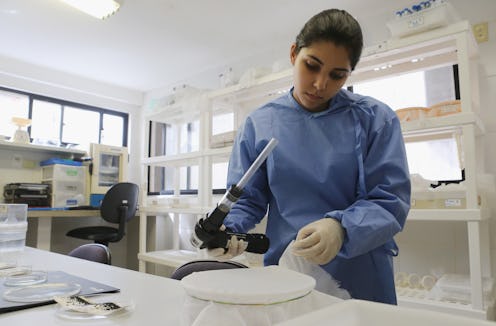News
How To Help Babies With The Zika Virus
The mosquito-spread Zika virus is making headlines around the world after the World Health Organization declared it likely to spread across nearly all of the Americas. The infection causes fever, rash, joint pain, and conjunctivitis and is also gaining notoriety because of its link to Guillain-Barré syndrome and birth defects after pregnant women are afflicted. The Centers for Disease Control (CDC) has issued a travel alert for people traveling to countries and regions where the virus transmission is highly active. Presently, there is no vaccine for the Zika virus, so here's how to help babies and people who are in need.
A vaccine may eventually become a possibility, though it wouldn't occur soon enough to help those currently affected and who may become affected in approaching months. Places like Brazil, Colombia, and Mexico, along with much of Central and South America are currently the most affected. The majority of depictions of the virus are of babies with microcephaly — or abnormal smallness of the head — after thousands of infants in Brazil were born with the abnormality. The CDC is recommending that infants born with microcephaly be tested for Zika, and that those without microcephaly but born to mothers who tested with positive or inconclusive results also be tested. Health officials are encouraging mothers to avoid pregnancy if living in one of the Zika-active countries, though many of these women do not have resources to aid them in proper family planning, which is why the following organizations are currently so crucial.
Catholics For Choice
Catholics for Choice is a religious-based organization that is working to change reproductive health policies in Latin America, like providing emergency contraceptive pills, for example, to prevent pregnancies bearing virus-stricken infants. They are accepting monetary donations to fund their cause.
The Foundation For Children With Microcephaly
The Foundation for Children with Microcephaly is always collecting funds to aid babies and children who are stricken with the condition. Tax deductible donations can be made at this link.
UNICEF
UNICEF is providing mosquito nets, among other services, to children and families in need, which can — in some cases — ultimately prevent infant microcephaly.
The United Nations
The United Nations, of course, is accepting qualified volunteers both online and in afflicted nations. Their Online Volunteering Service offers assistance to Latin and South America in crisis situations, such as helping babies afflicted by the Zika virus.
The Cortical Foundation
A less conventional way to get involved is to participate in a genetic study to assist researchers in understanding disorders like microcephaly. The Cortical Foundation lists some clinics that are in need of participants for studies to better understand cortical malformations.
Although Zika is not reported in the United States, is it suspected that mosquitoes may carry the infection northward as the weather warms up. The best way to avoid the virus is to steer clear of traveling to countries where the virus is most active, and wear an EPA-approved repellent over sunscreen, as well as long sleeves, long pants, and closed shoes. Keep screens on windows and doors, and sleep in air conditioned, screened-in rooms if travel is necessary. Until a vaccine comes about for Zika and a cure emerges for microcephaly, the best alternative is avoidance, and always, to help others in need.
